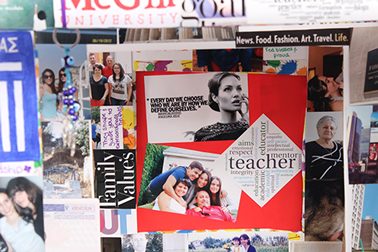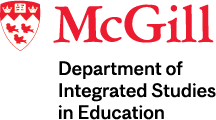 The issue we will investigate is the nature of pre-service teacher (PST) self-identity, which we argue is an essential component in teacher preparation (and ultimately in-service practice) in order that students develop a strong sense of self-awareness and self-efficacy—the potential to be a valued member of the education community and have a satisfying career. Thus we endeavour to prompt in our students their personal inquiries into the question: Who is the self that teaches? Our project will examine those inquiries, with particular attention to students’ capacities for reflection upon, and articulation of, their evolving self-identities in relation to their chosen profession. Our strategy is to use material culture as the vehicle for investigation.
The issue we will investigate is the nature of pre-service teacher (PST) self-identity, which we argue is an essential component in teacher preparation (and ultimately in-service practice) in order that students develop a strong sense of self-awareness and self-efficacy—the potential to be a valued member of the education community and have a satisfying career. Thus we endeavour to prompt in our students their personal inquiries into the question: Who is the self that teaches? Our project will examine those inquiries, with particular attention to students’ capacities for reflection upon, and articulation of, their evolving self-identities in relation to their chosen profession. Our strategy is to use material culture as the vehicle for investigation.
Although significant research in teacher education has been undertaken in the last decades, the role of material culture as formative in the development of pre-service teacher identities offers a site of new epistemological understandings in teacher education. Material culture provides: (1) concrete artefacts available for empirical examination; (2) a reference point for symbolic interpretation; (3) a lens through which to deconstruct the sometimes-problematic, frequently unarticulated and even inchoate nature of student-teacher perceptions in ways that define the conditions, practices and products of what constitutes becoming a teacher in the 21st Century.
If our project can bring clarity to those definitions then it may help to create more realistic understandings of what being a successful teacher means. Further, it will demonstrate the viability and practicality of incorporating the arts more centrally in teacher education programs. Ultimately, increased understanding of connections between arts-informed self-definition and successful, satisfying teaching practice may enable pre-service education programs, education ministries, curriculum designers and school boards to adopt strategies to address and reduce current rates of new-teacher attrition, thus benefitting society. That is, although our study does not address the problem of teacher attrition directly, it should be of interest to researchers for whom that is the key issue.
Our specific research agenda will involve: (a) working with participants from three universities—McGill (10 students), Concordia (10 students), and Lakehead (10 students). We will elicit pre-service teacher engagement with the question of teacher self-identity through their creation of: (i) 2D and 3D artefacts such as textiles, drawings, photography, and so forth; (ii) experientially-based critiques in the form of creative writing, such as poetry or narrative, in response to existent material culture within the local community; (iii) a combination of these arts-based learning vehicles; (b) training graduate students from the three universities in methods of data collection and analysis; (c) analysis of the artefacts will be supported with interviews, video and audio taping of artefact production (d) dissemination of the research findings through publications, presentations, workshops, a web site and exhibitions.
The proposed project will provide leadership to the research community through its emphasis on creative endeavour as a critical part of PSTs’ education, its assessment of the value of arts-based objects as teaching tools within the teaching profession, and through its integration of teacher education research, material culture, and visual arts theories.
Benefits to non-researchers, such as classroom teachers, rests in the model we provide for a focus on the arts across the curriculum as a way to engage students in embodied, holistic learning. Such engagement may well help to counter drop-out rates that persist in Canadian schools.
Contact: Dr. Boyd White
(514)398-4527 Ext. 00730
Room 351, Education building
boyd.white [at] mcgill.ca (Email)boyd.white [at] mcgill.ca ( )
